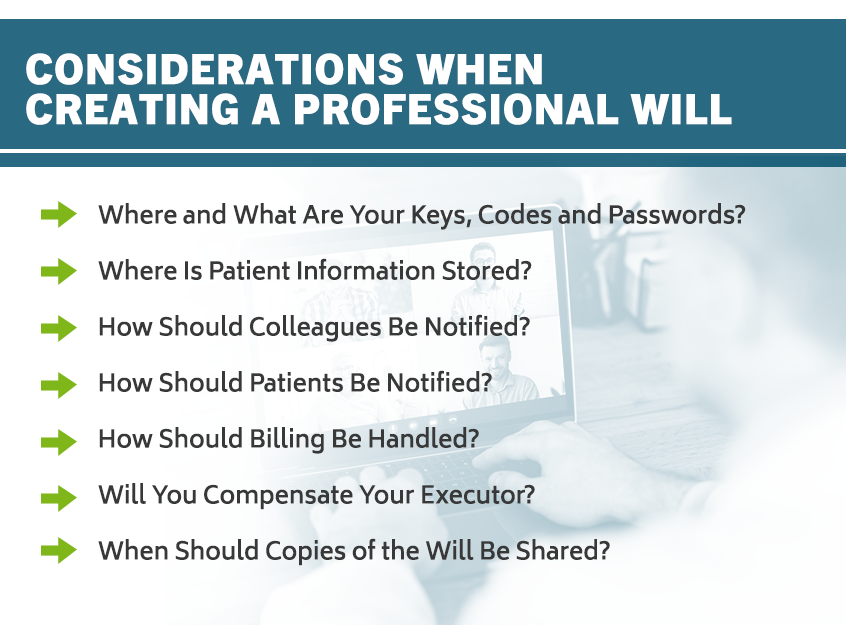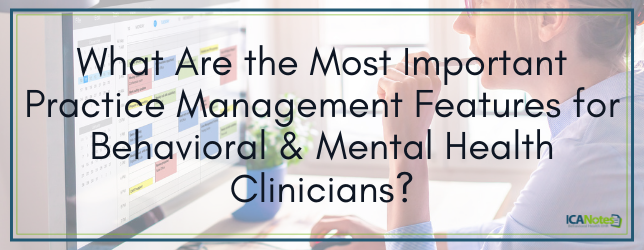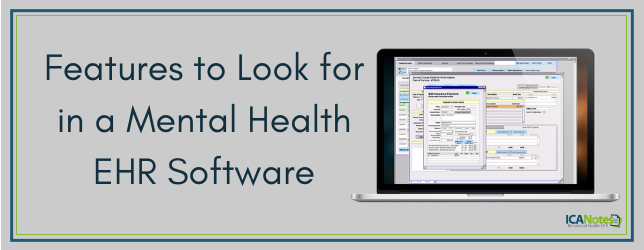Creating a Professional Will as a Therapist

Mental health clinicians, psychologists and therapists have a number of patients and clients who rely on them for their services. Creating a professional will as a therapist ensures your patients, practice and colleagues are taken care of in the event that you suddenly become incapacitated or pass away. Find out why having a professional will is so important and what you should consider including in yours.
Table of Contents
- What Is a Professional Will in Mental Health?
- Why a Professional Therapist Will Is So Important
- How to Create a Professional Will
- Considerations When Creating a Professional Will
- Don't Wait to Create Your Therapist Professional Will
What Is a Professional Will in Mental Health?

As a mental health professional, you are responsible for providing care and support to clients and patients, as well as keeping their patients' records secure and confidential. Your patients rely on you and expect you to always have their best interests in mind. So, what happens when you're unexpectedly unable to provide care due to death, serious injury or other unfortunate circumstances? A professional will can help therapists and other mental health clinicians establish a plan for experiencing an unexpected death or incapacitating injury.
After the unexpected death of a mental health professional, grieving family members and colleagues are tasked with the process of closing the therapist's practice and notifying patients. In some cases, this can raise confidentiality concerns and interrupt patient care routines, which can be hard on many patients. Additionally, a therapist or psychologist's documents, records and patient records may be stored on secure computers with passwords or in a lockbox that requires a key.
In a professional will, a mental health professional will designate someone, typically a trusted colleague, to be their executor. The executor agrees to become responsible for handling any issues or tasks that arise due to the therapist's incapacity or death. This most often includes notifying patients and colleagues, closing the practice, completing billing, taking care of documents and records and handling legal issues.
The professional will provides all the contact information, locations of keys, passwords and other information vital to accessing the therapist's office and records to complete the tasks asked of them.
Why a Professional Therapist Will Is So Important

Professional therapist wills are important for practical, legal and ethical reasons:
- Practical: Practically, therapist wills create a thorough plan for closing a practice after unexpected events, helping prevent confusion regarding who should handle these tasks and how. Without a professional will, spouses or other family members who are unprepared to handle the technicalities of mental health care affairs are forced to do just that. This can result in additional burdens on family members, adding stress for these individuals and the patients, as they'll be looking for guidance.
- Legal: Many states and ethics codes require mental health professionals to keep patient records for a certain amount of time, even after their death. Professional wills can help ensure the executor properly handles all records to remain compliant with legal guidelines. This also helps prevent putting family members through potential lawsuits or consequences related to the therapist's estate.
- Ethical: As a mental health professional, you likely have a lot of empathy for your patients and would hate to leave them without help in the event of your passing. Ethically, your professional will may include referrals to other psychologists so your clients can continue their care in your absence. Your death or incapacity would likely be difficult for many of your patients to process, so providing ongoing care options for them will help enhance their continuity of care.
A professional therapist will is so important to create now rather than later. Having a plan for your practice or position within a practice ensures everything can be handled and transitioned smoothly in your absence. Unfortunately, there is no way of knowing if your will may ever be needed, though it's best to be prepared for the worst so you can leave your patients and practice in good hands.
How to Create a Professional Will
While it can be difficult to think about what will happen to your practice after you pass, knowing how to create your professional will can help simplify the process. Some organizations provide formats for professional wills, which can be helpful in determining how to create yours. If you have your own practice, you'll likely have to find a template or create your own. While there's no one way to create a professional will, here are a few things you should be sure to include and do.

1. Choose an Executor
The first part of creating your professional will is choosing an executor. Knowing you will be tying up all your loose ends will help you plan more efficiently. It's best practice to also choose a secondary executor to serve as a backup in case your primary executor has their own obligations that may prevent them from taking care of your practice on short notice. The most effective person to be your executor is likely a trusted colleague, perhaps one you worked closely with or who may have known some of your patients.
2. Provide Detailed Instructions
The next step is to provide detailed instructions for all the tasks you'll need your executor to complete on your behalf. It may be challenging to think of everything that would need to be taken care of. Here's a general list of things you should be sure to include instructions for in addition to anything specific to your practice:
- A list of everyone who needs to be notified and the information for their preferred method of contact
- How, where and for how long patient records should be kept
- Contact information for your referrals and how this should be offered to your patients
- Where to find passwords and keys to access records and other documents
Make sure you include any information that may be vital and helpful to make the process of closing up your practice go as smoothly as possible.
3. Consult With an Attorney
Whether you're writing a personal or professional will, it's always best to consult with an attorney to ensure you've covered all the bases. Having a legal professional review your documents can help prevent problems from arising after your passing. It also provides your executor with someone to consult regarding any legal questions that may come up as they complete the wishes laid out in your professional will.
When you consult with an attorney, it's best to review both your personal will and professional will at the same time. This helps ensure there are no inconsistencies between the two that may cause unintentional confusion and conflicts. It's helpful to all parties if the wills mention each other so all assets can be disbursed without complications.
4. Make Updates as Necessary
Practices, passwords and patients can change in an instant. It's important to keep in mind that, as your situation changes, your professional will should also change. Be sure to review your will at least once a year to ensure it's the most up-to-date copy possible. Keeping your therapist will updated will help reduce stress on your patients and executor in your absence.
Considerations When Creating a Professional Will
Writing your therapist will can be overwhelming, and you may not know what information to include. To ensure you include as much detail as possible, here are some considerations you should think about including in your professional will.

Where and What Are Your Keys, Codes and Passwords?
Something that often gets overlooked is the numerous keys, entry codes or passwords necessary to access your office, computer and files. While these things may feel like second nature to you when you use them to access your practice, your executor will have no way of knowing where you keep keys for filing cabinets, storage rooms, your office or the building. Be sure to explicitly describe where all keys can be found, as well as the code to any security systems or safes you may use.
Additionally, provide login information for your computer. If you have passwords protecting certain folders or documents the executor may need to access, be sure to include these, too. If there are specific folders or documents that the executor will need, it's helpful if you describe where they can be found on your computer. Doing so can help save the executor time from digging through your computer files.
Where Is Patient Information Stored?
The same can be said of patient records, files and other information. Your clients will need to be contacted quickly, so being able to locate and access patient files is crucial. Some of your patients may experience a crisis at the news of your passing or incapacity, so access to their records can help the executor deliver the information and handle the situation more effectively. This is also where you should indicate what is to be done with the records and how that change will be announced.
How Should Colleagues Be Notified?
Make note of which colleagues will need to be notified quickly. If you regularly consult or work closely with any colleagues, ensure they're notified promptly.
If you're part of a group practice, co-lead group therapy sessions or regularly present at conferences, list the other colleagues involved in these situations so the executor can reach out to them personally. This may be where you outline any specific messages or information your colleagues should have.
How Should Patients Be Notified?
As you outline instructions for notifying your patients, it's best to take some time to consider the best method for sharing this information. There are several options depending on how the majority of your patients tend to contact you. You may choose:
- A phone call
- Answering machine message
- Written notice
- Having the answering machine indicate to call the executor for more information
Consider how your patients may respond to each of these options and consider how you would want to be notified. You'll have the best sense of what will work best for your practice and your patients. You might also consider outlining some resources your patients may find helpful as they process the news, like a colleague that will make time to help them deal with their grief.
The process of notifying patients should be handled with a high level of care because of their rights to privacy. Some patients do not share with family and friends that they see a therapist or other mental health professional. Be mindful of a patient's privacy as you choose the notification method so there's a reduced risk of the message getting intercepted. Consider your patients' preferred method of contact and consider special circumstances for certain patients to avoid putting their privacy in jeopardy.
How Should Billing Be Handled?
Your professional will should also indicate where billing and financial records are and how any pending charges should be handled. Some therapists choose to forgive some or all of a patient's remaining balance, and others may choose to provide a free session with the executor to discuss current and future therapy needs. Provide explicit instructions for billing information so your executor knows what to do.
Will You Compensate Your Executor?
Unexpected deaths and injuries take friends and family by surprise and often disrupt life for a while. As you write your professional will, consider that your executor will likely have to put their responsibilities on hold while they take care of yours. Providing compensation for their help can assist your executor in the event that they have to miss work or put projects on hold until your practice is settled and patients are taken care of.
There are many ways to provide compensation to your executor, and they may even refuse to accept anything. You may choose to come to an agreement together so everyone's expectations are on the same page.
When Should Copies of the Will Be Shared?
Because your professional will contains information regarding patients, contact information, passwords and secure files, many therapists and psychologists choose to withhold copies of their will. In this case, special arrangements would be made, likely with an attorney, so the executor only has access to the sensitive information in the will after the therapist's death. Doing this prevents confidential information from being written in multiple locations, thus putting it at risk. You'll likely entrust your attorney with a copy, though it's worth considering when additional copies should be shared.
Don't Wait to Create Your Therapist Professional Will
Though most mental health professionals don't end up needing their professional will until they retire, it's best to write yours sooner rather than later. Unfortunately, illness and accidents can happen at what seems like random times. Because you never know what life has in store, creating your professional will now ensures you're prepared for the unexpected.
As you plan your professional will, it's worthwhile to consider consolidating your billing, patient, charting and document information all in one place to make finding and accessing the information simple for your executor. Electronic health record (EHR) software like ICANotes provides a centralized location for all your secure information. Directly from our software, you can create and store progress notes, file patient records, generate bills, manage documents and schedule appointments.
To find out how ICANotes can help you manage your practice and keep your documents organized, contact our team today.










